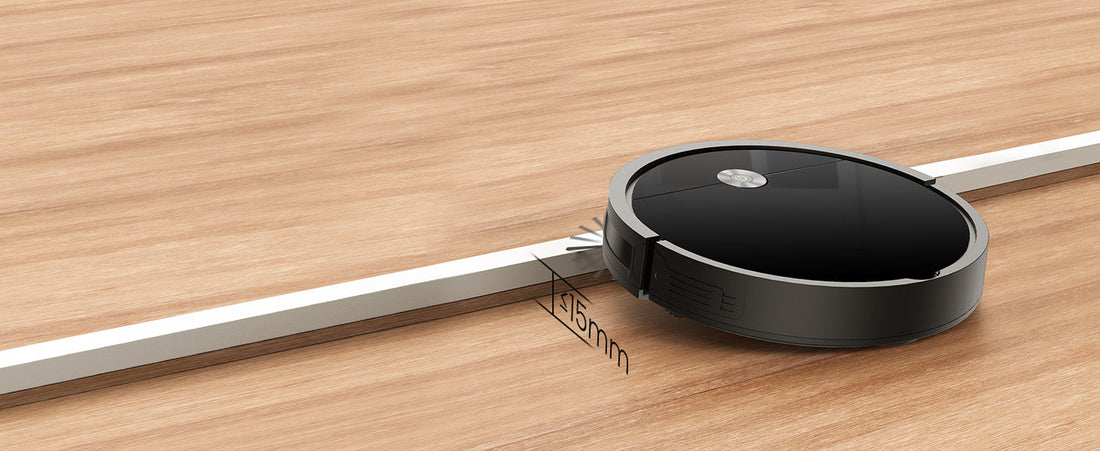That heart-stopping moment when you hear a unusual noise from downstairs and realize your robot vacuum might be exploring places it shouldn't. If you live in a multi-level home, you've probably experienced that panic. Stairs represent both a cleaning challenge and a potential hazard for your robotic helper.
But here's the good news: with modern technology and some simple precautions, you can enjoy automated cleaning without worrying about your robot taking a tumble down the stairs.
How Robot Vacuums "See" and Avoid Stairs
The Technology Behind the Safety
Most modern robot vacuums use a combination of sensors to detect and avoid stairs:
-
Cliff sensors that measure distance to the floor
-
Infrared sensors that detect drop-offs
-
Camera-based systems that recognize edges
-
LiDAR technology that creates precise depth maps
Why Sometimes They Fail
Even with advanced technology, accidents can happen due to:
-
Dirty sensors that can't properly detect edges
-
Black or dark-colored stairs that absorb infrared light
-
Very bright sunlight that overwhelms sensors
-
Worn carpet edges that create false readings
Essential Safety Features for Multi-Level Homes
Must-Have Technologies
When choosing a robot vacuum for homes with stairs, look for:
-
Multiple cliff sensors (at least 4-6 for reliable protection)
-
Regular sensor self-cleaning features
-
Software updates that improve edge detection
-
Manual sensitivity adjustments for different stair types
Redundancy is Key
The best robots use multiple sensor types working together. If one system fails, another backs it up.
Physical Protection: Your Second Line of Defense
Simple DIY Solutions
-
Baby gates at the top of staircases
-
Magnetic boundary strips for open-concept areas
-
Physical barriers for unusual stair designs
-
Visual markers for particularly problematic areas
Professional Options
-
Custom-fit gates that match your decor
-
Retractable barriers that disappear when not needed
-
Smart home integration with automated protection
Creating a Stair-Safe Cleaning Routine
Pre-Cleaning Checklist
Before starting your robot:
-
Check all sensors for dust or debris
-
Verify virtual barriers are active
-
Close doors to rooms with stair access
-
Clear stair edges of any objects
Smart Scheduling
-
Clean during daylight hours when sensors work best
-
Avoid cleaning during extreme weather that might affect sensors
-
Schedule stair-adjacent cleaning for when you're home
Choosing the Right Robot for Your Stair Type
Different Stairs, Different Needs
-
Carpeted stairs: Better sensor detection but potential for edge fraying
-
Hardwood stairs: More challenging for sensors but cleaner edges
-
Spiral staircases: Require extra precautions
-
Open-riser stairs: Particularly dangerous - needs maximum protection
The Vactidy Cleanova W11 Advantage
For multi-level homes, the Vactidy Cleanova W11 (marketed as Vexilar W11 in certain international markets) offers particularly robust stair protection features. Its LiDAR Technology for Precise 360° Scans creates detailed maps that include stair locations, while multiple cliff sensors provide redundant protection against falls.
The advanced navigation system doesn't just avoid stairs - it remembers their exact locations and approaches them with extra caution. The App & Voice Control allows you to set up virtual no-go zones around staircases with precision, and the regular software updates continuously improve stair detection algorithms.
What makes the Cleanova W11 particularly suitable for multi-level homes is how these safety features work together with its cleaning capabilities. The 180 Minutes Running Time means it can clean multiple levels without risking battery failure near stairs, and the 5000 Pa Strong Suction Power ensures thorough cleaning right up to - but not over - the edges.
Emergency Preparedness: What If Something Goes Wrong?
First Response Protocol
If your robot does fall:
-
Immediately turn it off
-
Check for visible damage
-
Remove from stairs carefully
-
Contact customer support
Prevention Over Reaction
-
Regular maintenance checks
-
Sensor testing routines
-
Backup physical barriers
-
Insurance consideration for expensive models
Long-Term Maintenance for Ongoing Safety
Monthly Safety Check
-
Test all cliff sensors with the manufacturer's recommended method
-
Clean sensor windows with appropriate materials
-
Update software to latest version
-
Check physical barriers for wear or damage
Seasonal Considerations
-
Winter: Watch for reduced sensor performance in low light
-
Summer: Be aware of sunlight affecting sensor accuracy
-
Spring/Fall: Regular deep cleaning of all sensors
Beyond Technology: Common Sense precautions
Simple Habits That Prevent Accidents
-
Always close doors to rooms with stair access
-
Use physical barriers during initial mapping
-
Supervise first few cleaning cycles in new areas
-
Keep stairs well-lit during cleaning times
When to Consider Professional Help
-
Unusual stair designs (spiral, floating, or open-riser)
-
Very dark stair materials that challenge sensors
-
Homes with very young children or pets where extra caution is needed
The Future of Stair Safety in Robot Vacuums
Emerging Technologies
-
AI-powered edge recognition
-
3D mapping of entire homes including stairs
-
Better sensor fusion between different technologies
-
Smart home integration with stair gates and lighting
What to Look for in Future Models
-
Improved dark surface detection
-
Better performance in bright light
-
More customizable safety settings
-
Enhanced recovery features if falls do occur
Your Stair Safety Action Plan
This Week
-
Test your current robot's stair sensors
-
Install basic physical barriers if needed
-
Clean all sensors thoroughly
-
Review your cleaning schedule for safety
This Month
-
Practice emergency procedures
-
Check insurance coverage
-
Research additional safety accessories
-
Train household members on safety protocols
Ongoing
-
Monthly sensor checks
-
Regular software updates
-
Seasonal safety reviews
-
Staying informed about new safety features
Remember: while no system is 100% foolproof, combining technology with common sense precautions creates a safe environment for your robot vacuum to work effectively in your multi-level home.
The goal isn't to eliminate all risk - it's to manage risk so you can enjoy the convenience of automated cleaning without constant worry. With the right precautions and equipment, your robot vacuum can safely clean your entire home, stairs included.

